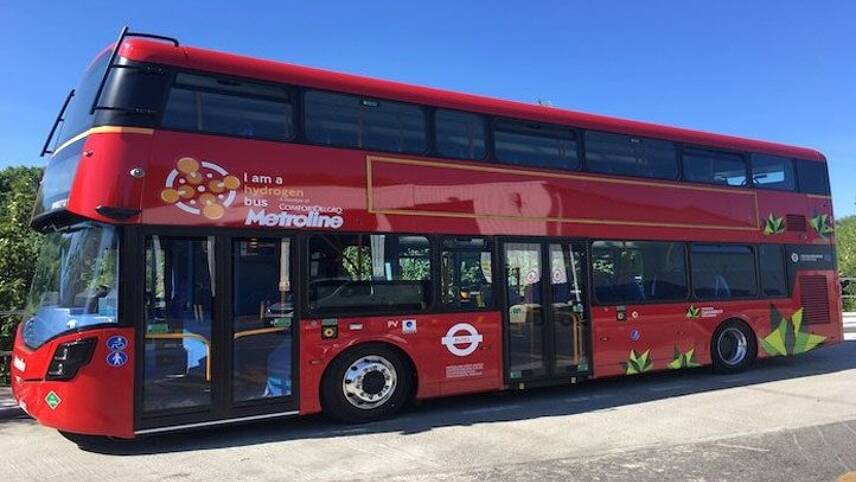Register for free and continue reading
Join our growing army of changemakers and get unlimited access to our premium content

Image: TfL
The vehicles, manufactured by Wrightbus, will be used on the number 7 route, which runs between East Acton and Oxford Circus. They are classed as zero-emission. Such buses are already in operation in Aberdeen and will soon be rolled out in Bristol.
Hydrogen used to fuel the new London buses is being produced at Air Liquide’s facility in Runcorn, Cheshire, which processes waste hydrogen from the industrial chemical industry. From 2023, the facility will be converted to produce only green hydrogen – a term used to describe hydrogen produced using electrolysis powered by renewable electricity.
Transport for London’s (TfL) other business partners for the new hydrogen fleet are Luxfer, which is manufacturing has cylinders, and Nel Hydrogen, which has installed a refuelling station at the Perivale bus depot in Ealing. Each bus will need to refuel once a day.
TfL’s overarching sustainable bus commitment is to operate only zero-emission vehicles by 2030. Aside from hydrogen, it is investing heavily in electric models, with more than 500 electric buses currently in operation. All other buses have been retrofitted to meet the Euro VI emissions standard.
“London may have one of the cleanest bus fleets in Europe, but we need to continue to act now to tackle climate change and the city’s toxic air quality,” TfL’s interim director of buses Geoff Hobbs said.
“Introducing these hydrogen double-decker buses to our fleet, alongside electric buses, diversifies our green bus portfolio and helps us use the right technology for the varying operational requirements of our vast network. This will help Londoners breathe cleaner air.
“Our investment in hydrogen won’t just benefit London, either. Outside the capital, we are supporting jobs across the UK and our involvement with the industry across Europe is making cleaner fuels more affordable to cities all over Europe.”
Funding for the 20 new hydrogen buses has been jointly provided by TfL, the UK Government’s Office of Zero-Emission Vehicles and two European bodies – the Fuel Cells and Hydrogen Joint Undertaking, and the Innovation and Networks Executive Agency (INEA). The total cost stands at around £12m.
A recent Bloomberg Intelligence report forecasts that, globally, hydrogen will account for 25% of final energy consumption in road transport by 2050.
The bigger picture
London is just one of several UK cities to have added hydrogen buses to transport strategies.
The UK Government’s plan for bringing all towns and cities along is the updated National Bus Strategy. First published in March, the Strategy will result in a ban on new diesel bus sales, with consultations underway regarding the appropriate timeline and the other measures that will need to be taken to support bus manufacturers and operators.
British-built electric and hydrogen buses are touted in the strategy as the alternative to diesel. The Government is aiming to deliver 4,000 such vehicles over the course of this Parliament and has previously provided a multi-million-pound innovation funding pot to Wrightbus.
While green groups are generally optimistic about the new National Bus Strategy, concerns remain that the Government’s focus on decarbonising transport – the UK’s most-emitting sector – is still over-prioritising privately owned electric vehicles (EVs). A new report this week from the IPPR concluded that there could be a 28% increase in car ownership across the UK without more funding for public transport and active transport.
Join the conversation at edie’s Clean Energy & Transport Forum
Taking place on Thursday 15 July, the Clean Energy and Transport Forum is a brand-new online edie event that will connect energy and sustainability leaders from all major industries with policymakers, industry bodies, NGOs and net-zero carbon experts, to discuss what it will take to fully decarbonise our energy and transport systems.
The Department for Transport’s Parliamentary Under-Secretary of State Rachel Maclean has been confirmed as one of the keynote speakers for the event, along with The Climate Group’s chief executive Helen Clarkson, the Energy Institute’s chief executive Nick Wayth and Innovate UK’s senior innovation lead Harsh Pershad.
For a full agenda and to register now, click here.
Sarah George


A step in the right direction.
And when there is a total absence of wind, as there was for well over a week in August only last year, where do the electrolysers derive their electricity???
Renewable power is a catch-it-if-you-can source of power, not a reliable power base.
Sorry, just reality, but then I am just a retired chemist from the nuclear industry, AERE Harwell.
Richard Phillips